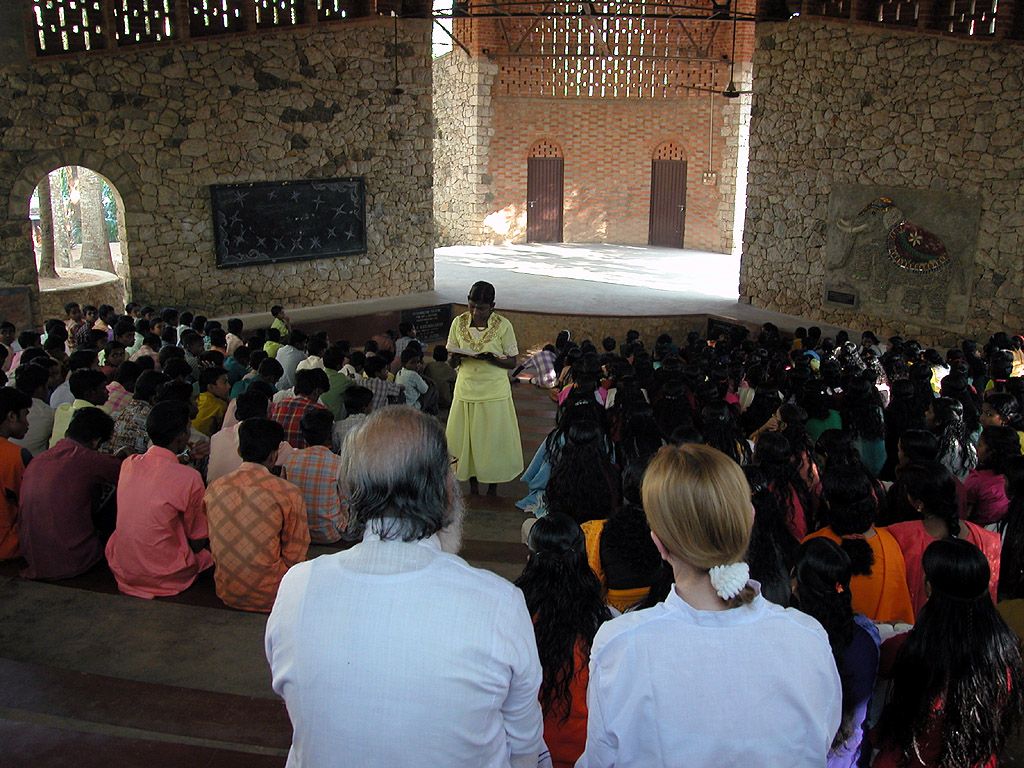Mitraniketan - Development Education
Sri K. Viswanathan, India
In this conversation the founding director of Mitraniketan, K. Viswanathan, tells about its integrated approach for development education. We talked in his office with gifts presented by local organisations and friends from all over the world. Mitraniketan is situated near Thiruvananthapuram or Trivandrum in Kerala in Southern India.
We learnt about Mitraniketan through the Association of Danish Folk High Schools, who has co-operated with Mitraniketan in development-projects. K. Viswanathan is also a Servas host.
Growing rice
Traditionally much labour is needed to grow rice, and many farmers here in Kerala have stopped producing rice and made banana gardens. But the day before yesterday I went to visit some farmers, whom we have helped trying a new method of growing rice. It was developed in Tamil Nadu, and they seemed to have a bumper crop. With 10% of the usual amount of seeds, less labour, less water and use of organic fertiliser only, they grow more rice.
The farmers in the area were all very happy and said, that they would take up this method. Other farmers are coming to see what they have done, and there will soon be a demonstration, that will probably be broadcast so more people will know. We may also make a seminar about it on Kerala level. I think that the results are very favourable, and we hope that farmers will take up having rice paddies again. - This is a good example of how Mitraniketan works.
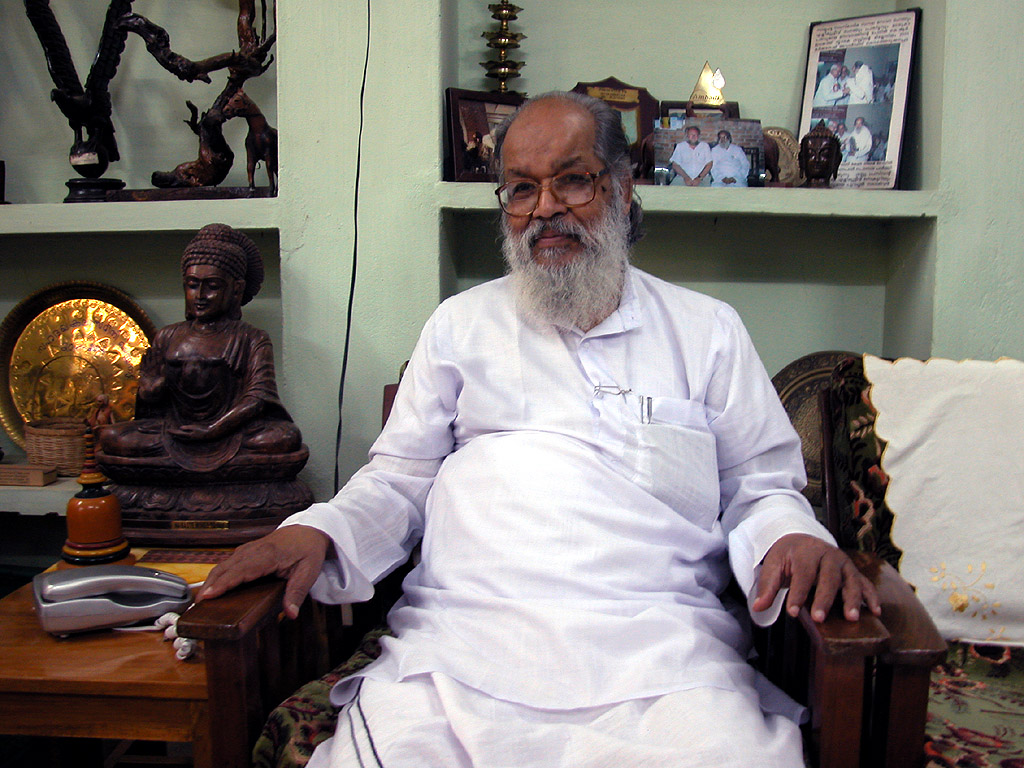
Development education
If I put it in a simple form Mitraniketan is an integrated approach for development education. It combines education aspects and development aspects in an integrated manner. Mere literacy is no education. Education is a development process in an all round manner. It enables a person to perform things, and at the same time he should be a full-grown individual responsible to himself, to his family and to society. If that is done, probably our work is also satisfactorily performed.
With this in mind we have developed a regular school-program, which is not merely about literacy but also includes vocational training. Besides their ordinary lessons the students learn to enjoy music, dance and games. It is important to tend to the head, the heart, the hands and the health to create all-round development. It is also important to trust children, give them freedom and let them do things.
We now have a nursery school, a primary school, a secondary school and the People's College. These institutions are the core of Mitraniketan and our other sections and workshops in agriculture and crafts are feeding our main activities. They provide vocational training for our schools and help people in the community.
We have around three hundred students mostly from the tribal community and scheduled castes. We prefer to help these backward groups, who don't get much attention even from the government. It is a difficult task, but I am happy that our young people after spending ten years here come out as responsible citizens.
We have not perfected the whole thing due to a shortage of personnel. We don't have permanent teachers, because we can only pay less than half the salary, that they will get from a government job. Therefore we assure them that they can leave if they get another job. But the teachers are happy to work here and follow our guidance, and they gain experience, which they can use in government schools. A number of teachers who have worked with us, have joined schools in the neighbourhood, and they establish a good linkage between those schools and us.
We collect our funds from people and friends, as the government does not support our schools. We need an average of 1000 Rs. to have one child here for one month. And it is a main concern for us to get the necessary funding. The developing middle class in India has to be nurtured, and some day they may be able to support initiatives like ours, but today it is enough, if they are able to manage their own affairs.
Still we are quite happy, when you care for the children the affection you get and the love you enjoy is most rewarding. They experience a spontaneous free growth. We don't believe in corporal punishment; they have a self-regulation, and they are very happy. That is the positive side of what we have been trying here, but we wish we could do much better.
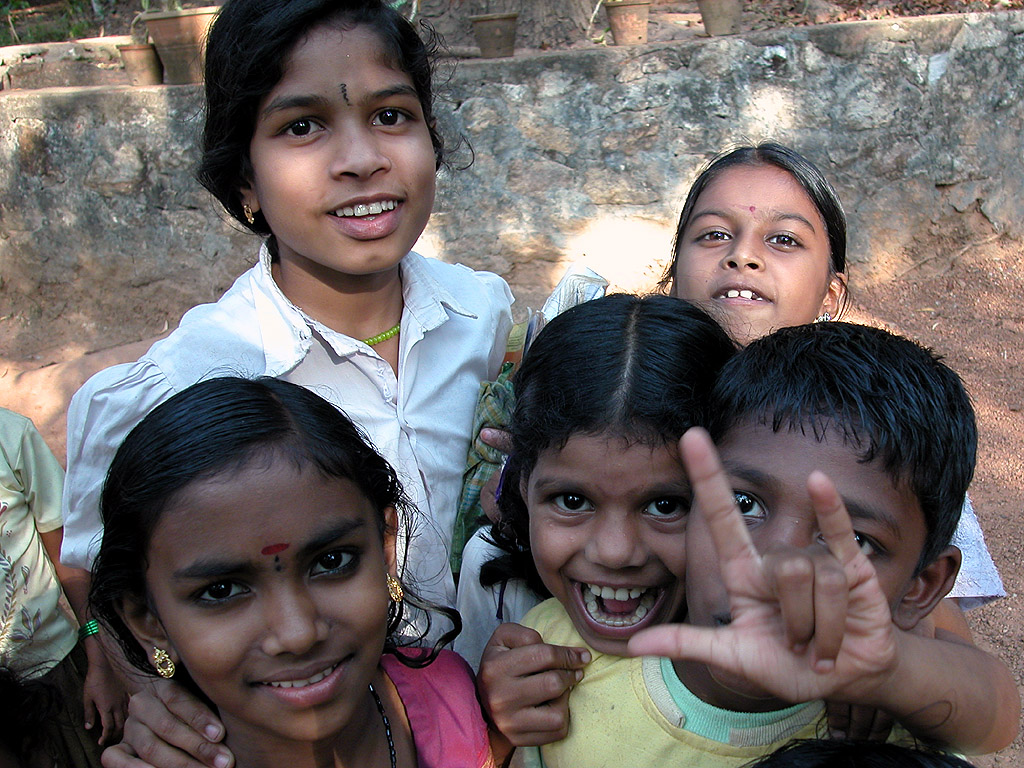
Co-operative economic programs
Mitraniketan started with the nursery school, and that gave me access to the parents and the local community. They were economically disadvantaged, and those in debt would perhaps only have two or three coconut trees that were mortgaged to others. This made me start a co-operative venture.
The women would go to the market to sell and buy things, in that process they might have some small savings. I thought that a good way of helping them would be to teach them how to save their pennies. So I told them to put the money in a box and keep it for a month, and then open the box to calculate what they had. I also told the children, that they could help their parents by not eating toffee and save the money.
In that way we were able to collect fairly a good amount of money among the parents, I think about 5000 Rs. As we could not have more co-operatives of the same nature, we reorganised an existing one. The people converted their savings into shares costing five Rs. Thus they were able to accumulate enough to redeem the coconut trees they had mortgaged. They were all very happy and became members of the co-operative.
I left this co-operative after it became a bank. When I felt sure that they could run it by themselves, I told them that it was time for me to leave. It still works and helps the farmers with loans for improvements.
Similarly I organised a milk co-operative society, when there was hardly any milk available. Cows were considered sacred, and people would generally keep them as a good omen just to see a cow early in the morning. I convinced a priest that he should help us with a bull and three heifers from England, and he did so for only the cost of the transportation.
With that we developed a small dairy unit, and we continue this cattle development program. People generally still think that cows are sacred, but now they also see them as useful. If you visit our neighbours, you will find cows that give 15 or 20 litres of milk a day. When we started the project, their cows only gave one litre a day.
Recently I went to open an artificial insemination centre, there are more than 38 of these centres in Trivandrum district alone, and they are also taking up the distribution of seed and seedlings to the farmers. The farmers themselves maintain all of this. There are women taking part in these programs, and I am so proud of them. If everything else, we have developed, is gone, I will be satisfied with the performance of these people.
All of this is just like the small farmers I met in Denmark in 1955, who managed their communal affairs in co-operatives.
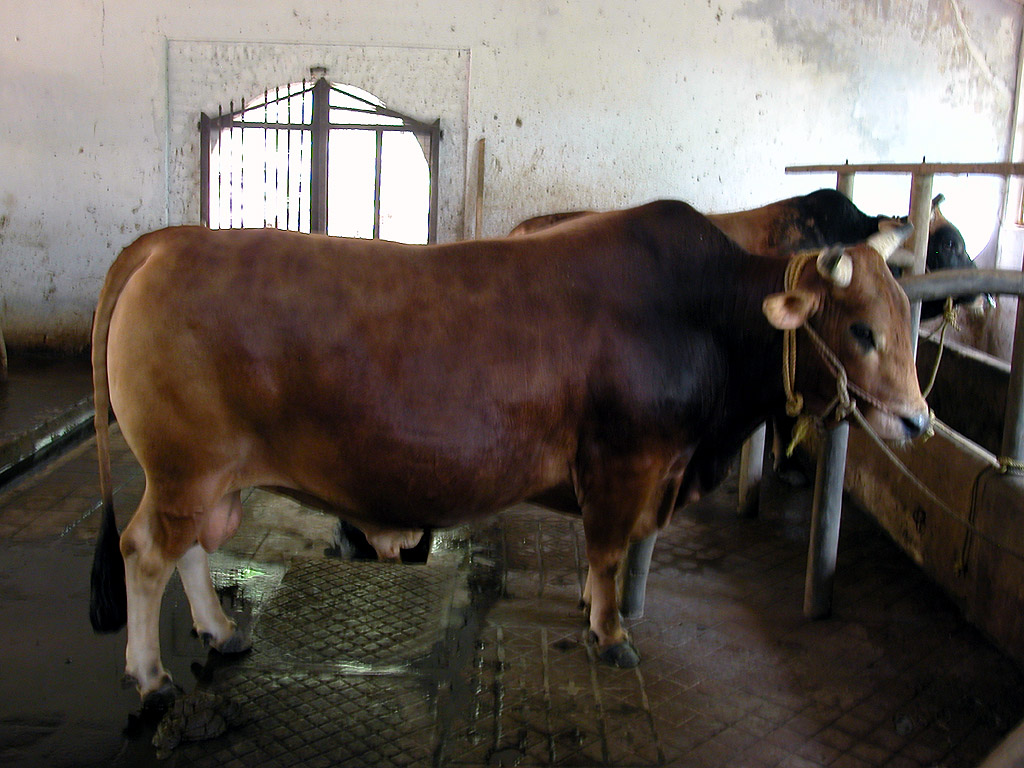
Gandhi attracted me
Already when I was 13 or 14 years old and had no voting right, I was very much attracted by the ideals of Mahatma Gandhi and his Khadi-Movement. It was difficult to get cotton here, but I managed to get cottonseeds and grow them. I spun cotton and gave the yarn to the khadi-store to get my clothes, in those days they were thick and not very nice clothes.
I kept this up in spite of a lot of criticism from people in the area, who supported the government. They tried to persuade my father to make me give up the hand-spun clothes and Gandhi-cap. But I took great pride in wearing clothes that were produced in India and were a symbol of our freedom. I not only became a member of the National Congress I also started campaigning.
When Gandhi was shot in 1948, it was a real chock to me. At that time I worked to make the downtrodden take advantage of free and compulsory primary education, which was first introduced in this state.
Another important movement was to get the untouchables into teashops and hotels. Just like the blacks in the United States, they were not allowed to sit in teashops or go to certain hotels. They had to go behind the building and drink tea from a shell or a broken glass, because other people could not drink from glasses, they had used. We approached owners of teashops and hotels to convince them, that they should be open to everybody and not just certain castes. We did this very politely. When they said, that if they opened, others would not come, we promised to be there to help them encourage the customers. So they opened, and people still came.
We also had problems with rowdy events, where money was requested to let women into public markets. There was no fixed amount, but if they didn't pay, the goods they carried on their heads would be pushed to the ground and shattered. We stopped this by simply being at the gates of the marketplaces.
I also founded a social and cultural organisation that staged plays. At that time the women would not come forward, so I performed as a heroine in a number of dramas. This organisation is still functioning well, and I am their patron. I also worked to strengthen the local library.
These engagements prompted me at a later date to devote my life to help these children to go to regular school. Education is a very important thing, and if it is also vocational it will help children become creative individuals, who are useful to society.
We did all this in a non-violent way, very politely but sternly, and this gave me encouragement and self-confidence. But the conservative forces in the village were strictly against my approach. I wanted the downtrodden to come up. There was a village uplift centre for this and the neighbouring village, and that was the beginning of the conflict. The privileged people wanted to control the centre in a top down approach. So I went to all the underprivileged people and told them, that the village uplift movement was meant for them, but if they didn't do something, they would loose control. I spoke openly to the public about this.
When the election was to take place a government officer presented a list prepared by the rich people. I stood up and said that it could not be that list exclusively. I first proposed the name of the person, who had read the list, and then other names were added. The result was that he was the only person from the original list. When one of the downtrodden was proposed as the convenor of the group, this man was infuriated. Therefore he tried to make arrangements with a number of people in the area to beat me up in order to stop me, but nobody came forward. Some of them even went to my father to warn him about it.
Then he made up a story, that because of my influence through some of the leader's, one of his family members had not become an inspector of police. This was actually due to his own influence. But the father of the man, who did not get the job, came to a public meeting and slapped me on my cheek, so that I fell down bleeding. I never suspected anything, because I knew him and had been in his house. I stood up and told him, "You have only fanned the flame, this will not stop here, I have not done anything wrong!" I asked people to take me to the hospital, and my father also came. When I had been treated in the hospital, my political leader told me, that the general of police should know, what his family member had done. So I went to file a complaint, but I also said, that I had no grievance, and didn't want any action taken.
Then my political leader and guru, who was in prison for more than eighteen years because of non-violent actions, and another friend of mine told my father, that I should go to Tagore's Santiniketan to study in order to prevent trouble. My own idea was originally to go to Gandhi's ashram, Sevagram, but he was shot in 1948.
Before leaving I met the person, who had slapped me in the same spot, where it happened. I was with my brother, who was slightly scared and said that perhaps we should go away. But then the man came and embraced me and started crying. I didn't know what to say. He said that he heard, that I was going and wanted to give me his blessing. He asked if he could come to my house, I said yes. And he came the next morning to have breakfast and say good bye; my father was also happy about this and let him come. We maintained our good relationship until the end of his life. He repented very much, and told it was a misunderstanding. Actually he was much like my own father.
Even in my younger days I was able to control myself and be non-violent, and I have kept this up till now. I don't consider anybody my enemy, we may have differences of opinion, but that can be settled.
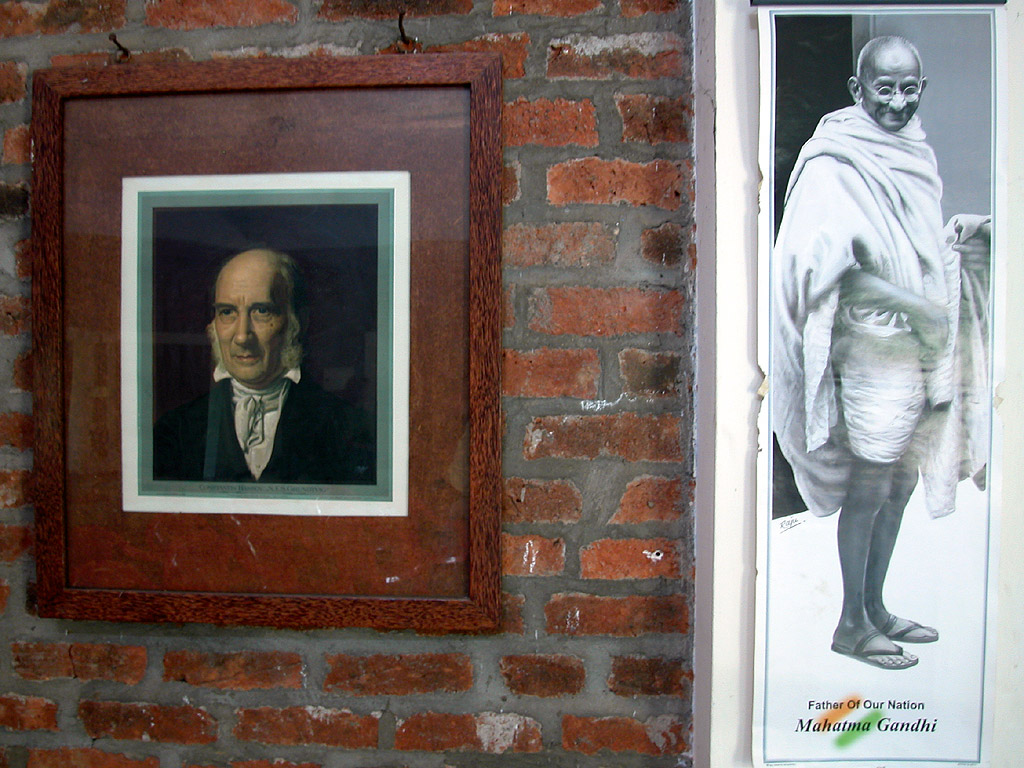
Santiniketan means Home of Peace
At Santiniketan I could not meet Rabindranath Tagore. He had passed away in 1941 and I came in 1949, when his son, Ratindranath Tagore, held the position.
I also had my disagreements there. Santiniketan means Home of Peace, so when they introduced military training in the university I couldn't relate to it at all. I was the warden of the hostel and was also serving as chairman of the Students' Union. In these two capacities I had a lot of influence over the students coming from all of India and many countries in the world.
When this happened, I decided to fast, and my principal and Ratindranath Tagore came to me to the hostel and said, "We agree with you, but we can't do anything, if we don't have financial support from the government, we shall have to close the institution. We don't have any towering personalities like Rabindranath Tagore now, but we have a good friend in Nehru, who is the Prime Minister, and he will help us. We will not make the military training compulsory it will be voluntary. Therefore you should accept this lime-juice and end your fast." So I had to accept this compromise and stop.
After many years they instituted an award in the name of Ratindranath Tagore, and the first one was given to me. I was really surprised, because I was a rebel, and they all knew. My principal became the Minister for External Affairs in the Nehru cabinet. He was a real teacher for me. He was also very helpful in getting my travel grant. When he came to meetings in the UN, while I was in the US, he asked me to come and meet him. Later he told me, that I had been right, but they had been helpless. And he advised me, not to become a slave to the government. I'm not anti government, but the dependency syndrome is dangerous.
After Santiniketan I went to Savagram and spent four months there prior to my departure for the United States. I studied Ghandi's Basic Education program, which was inspired by Tagore's thoughts. But I had already found out, that I preferred Santiniketan to Savagram during a visit in 1949. The followers of Ghandi had become more rigorous I think. And when idealism becomes rigid, it is not helpful. There should be freedom and spontaneity. Both places maintained the simplicity with open classrooms in a natural setting, which we also have in Mitraniketan.
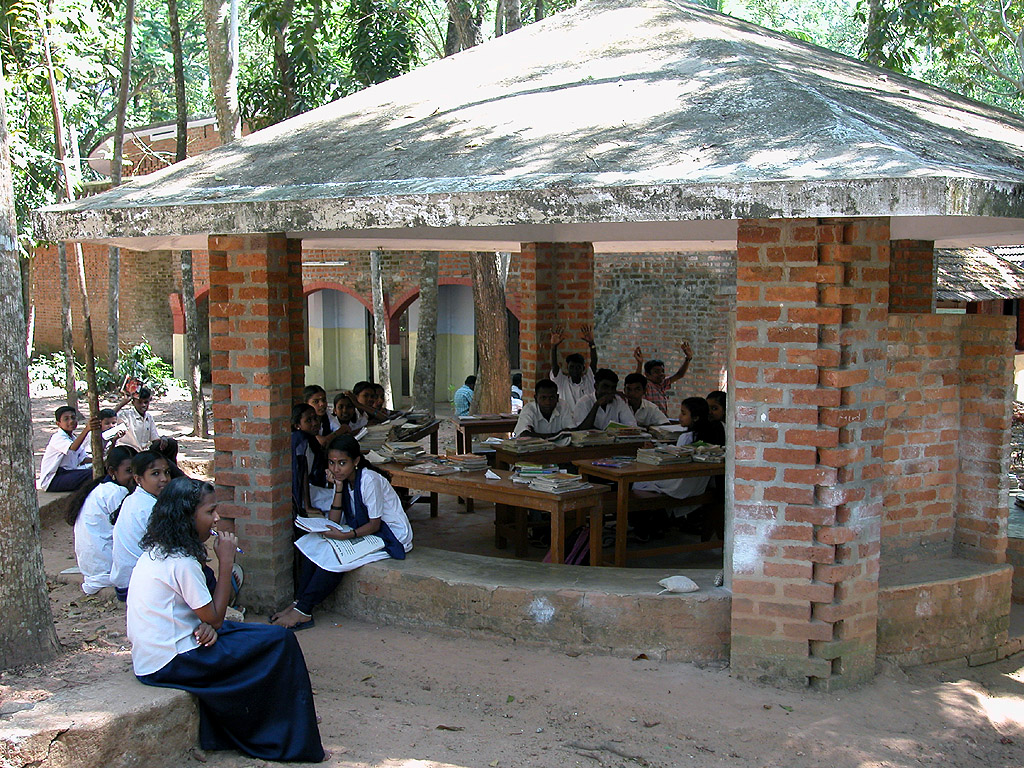
My journey was an eye-opener
My three years of travel in the 1950s gave inspiration to what I did in Vellanad, after I returned. I stayed in the United States for one and a half years. I stayed about one year in Denmark and the remaining period in England, Finland, Sweden and Holland. This journey was really an eye-opener to me.
You generally think of the US as a rich man's land, you don't think of the poor small people and entrepreneurs, who have organised credit programs themselves. The co-operative credit unions in the US were amazing, and I attended several of their regional meetings and national conferences. This was one of the things that prompted me.
Another thing was the folk high schools. I first met a folk high school in the Appalachian Mountains in the US, where European immigrants had made the John C. Campbell Folk High Shcool, it is still functioning very well. Miles Horden was a revolutionary in the US, who became a great support to Martin Luther King and his followers. He developed a school in Tennessee, the Highlander Folk School, where black people were brought in and trained. I had the privilege of spending a couple of weeks seeing how he did this, and I became a very good friend of him.
He was connected with the Community Service in Ohio, and its founder president, Arthur E. Morgan, became an important mentor to me, also after my return to India.
In Denmark I saw how the country had emerged as a great nation socially and economically, because of the influence of N.F.S. Grundtvig. He was able to arouse the consciousness of the Danish people. He brought back the prestige of the country and showed them, that they had their own cultural heritage in the folklore. He revived the folk-traditions and developed schools although he didn't live long enough to see them spread. Christen Kold, whose great-grandson has visited Mitraniketan, continued this work.
I think that the Danish folk high school concept has a universal appeal because it promotes democracy. I have met Russians who found it important to their development of democracy. And I have never seen it as foreign, because it is very similar to the Indian gurukula system, where teachers and students live together. When you go deep into it, you can see the underlying unity.
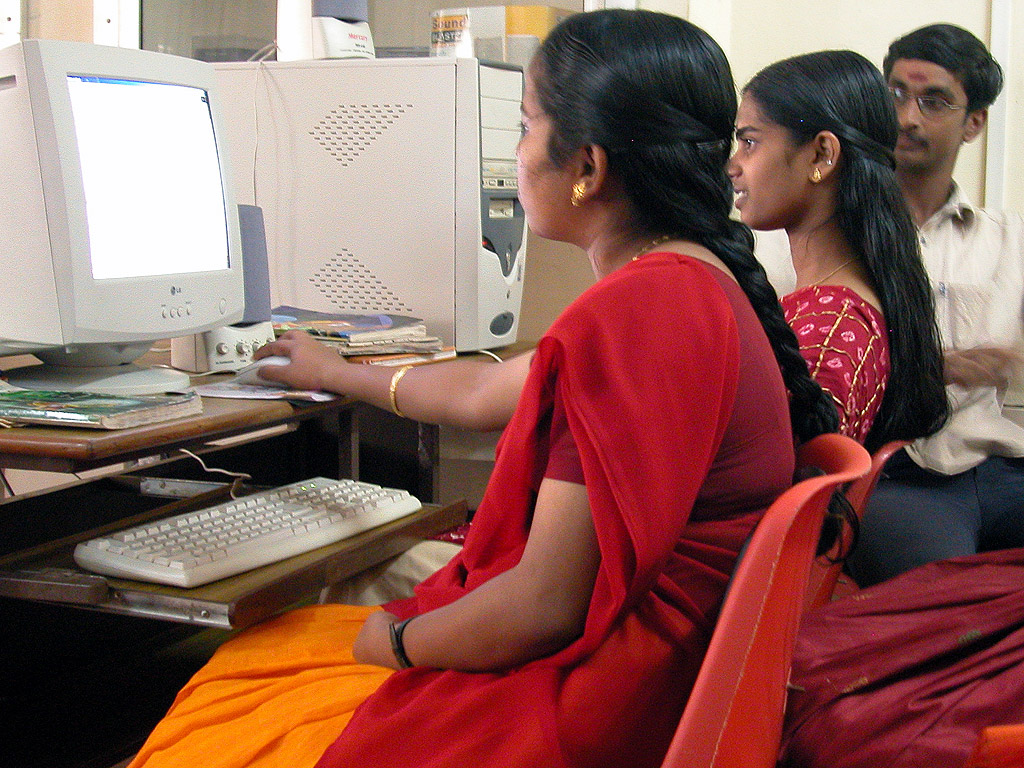
The next generation has a legacy
I am 78 but I feel that I am still young. Next year will be Mitraniketan's fiftieth anniversary, and we shall probably need to have a re-look at the whole thing to make it more permanent and sustainable in the future. You can't expect a lot of money from outside sources, and we are moving with a lot of uncertainties. We have not done the groundwork to attain sustainability. We may not be able to become 100% self-sufficient, but we certainly need a greater amount of sustainability.
We do have some ideas that may help us. If we modernise our printing press, it may become a source of income. We might develop wood-industry producing furniture for the middle-income groups and toys for primary and nursery schools. Our food industry that makes use of fruit may also be further developed - we might have a mobile wing and an outlet in Trivandrum. And we might develop our City Centre there to attract different courses.
I also hope that there will be many sister-organisations of Mitraniketan in India and elsewhere. Mitraniketan can't take more students. We could expand quantitatively, if we did we would not be able to maintain the quality of our work. But we think that we set an example to others, this is not a monopoly for Mitraniketan. I always tell people, "I have only shown what is possible, it is up to you to take it up as a challenge and go forward. Perhaps you can do better than we are doing." I have the feeling that anybody with the right mind can do this.
We have conducted a number of workshops at the international, national, regional and local levels to attract the attention of people. That is a way of spreading the seed. I hope more people will come forward and commit themselves to this kind of work. In India the problem is money, our government should also come forward, like the Danish government did. Today education is a lifelong process, and it is important, that there are centres, where people can come together to learn.
To me Ghandiism is a new religion containing the quintessence of all religions. I am a Hindu in the sense that Hinduism can find the truth in all religions. Temples should be widely open to everyone; some may be interested in the cultural aspects. I go to temple when I feel like it, and we have a church on our grounds, where I also go sometimes. Whether you call it Ghandiism or not, we have to return to a peaceful world.
I think that creating people to people contacts is a way of doing this, and we are members of the international friendship organisation Servas, which connects hosts and foreign guests. We are proud that Mitraniketan has around 1000 visitors every year. We should promote peace and friendship.
The next generation has a legacy to carry on, they can correct many things and go forward, development is a continuing process.
February 2005
Sri K. Viswanathan passed away in April 2014, his wife Sethu Viswanathan succeeded him as director of Mitraniketan.
